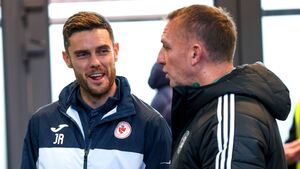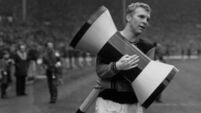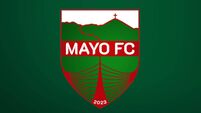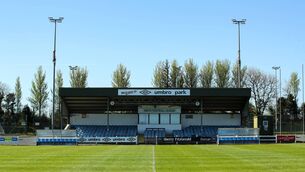Underrated but proving himself yet again

Sligo Rovers manager John Russell in conversation with Brendan Rodgers who brought his Celtic side to the Showgrounds for a mid-season friendly in October last. Picture: INPHO/Tom Maher
The new Champions League group stage format reaches its crescendo this week and, for the first time in over a decade, Celtic will be part of the knockout stage.
In the 2012-13 season, the Hoops managed to navigate their way through to the last 16 of the competition, with a famous 2-1 win over Barcelona at a rocking Celtic Park in the group stage the highlight of a memorable campaign.
It has been a lean time in the interim on the European front, but this season has seen an upturn in form on that score.
The Scottish champions have undoubtedly benefited from the kinder format, which pits all 36 teams into one single group. As things stand, they are guaranteed a place in at least the play-off round ahead of this week’s trip to Birmingham to play Aston Villa. From their seven matches so far, Celtic have lost just one (a seven-nil hammering against Borussia Dortmund in the autumn).
The Scottish football scene is a strange one, because success there is often considered to be less of an achievement when compared with the massive pull of the English game. Take Steven Gerrard, for example: he succeeded in guiding Rangers to the title for the first time in 10 years during his time at Ibrox but failed to make any sort of an impact when handed the reins at Aston Villa. He’s now plying his trade in the Saudi League.
Indeed, tracking the career progress of managers of either of the big two in Scotland shows one thing: they rarely go on to succeed to a large extent in any other job thereafter.
Martin O’Neill is one person who may have bucked the trend, in helping Villa to three consecutive sixth placed finishes in the Premier League and guiding Ireland to Euro 2016. Beyond that, it’s hard to make the case that any other manager in the modern era went on to achieve much beyond their time at Celtic. Ange Postecoglou, currently struggling at Tottenham, could prove to be yet another example.
It brings us, therefore, to the curious case of Brendan Rodgers, the current incumbent at Parkhead.
Rodgers is a figure that has fascinated me for some time. This stems, largely, from his stint at Liverpool between 2012 and 2015 which included that mesmerising season in 2013-14, when he almost brought the club to a historic Premier League breakthrough.
It wasn’t only that, though. Rodgers had Liverpool playing some marvellous attacking football which oozed class with Sterling, Suarez and Sturridge combining brilliantly in the final third while the aforementioned Gerrard was enjoying a renaissance in a deeper lying midfield position in front of the back four.
It is true to say that Rodgers does tend to talk a good game and maybe plays to the cameras at times. Perhaps for that reason, a certain stereotype exists around him, but his achievements as a manager haven’t received the acclaim they should. He is the best manager from the island of Ireland as things stand right now, and one of the best working across the Irish Sea at the moment. Of course, he has had bad times in his career but generally speaking he has been successful wherever he has gone.
This extends right back to his first job as a manger, at Watford, where he guided the club to safety in the Championship in 2009. His period at Reading wasn’t a success, but thereafter he won promotion with Swansea City to the Premier League.
His arrival at Liverpool, in the summer of 2012, came at a time when the club was at an exceptionally low ebb, football-wise and financially too. But, even if the league title challenge faltered in comical fashion in 2014, Rodgers still helped mould a team together that almost reached the Promised Land. Just two years previously, shortly before he took up the job at Anfield, Liverpool had finished in eighth place.
During his three years at Leicester, Rodgers guided the club to its first-ever FA Cup and two fifth placed finishes in the Premier League.
It’s at Celtic, however, that Rodgers has secured the most silverware. Across his two spells, he has three Scottish Premiership titles and three Scottish Cups.
Given many perceive there to be only two sides truly in contention to win those competitions – Celtic and Rangers – it’s easy to dismiss the significance of these achievements. But for those involved on the inside, they’ll tell you about the pressure and expectation once you take charge. Second best doesn’t quite cut the mustard and in such a pressurised environment, success can be difficult to achieve.
Celtic’s European progress this season adds another layer to Rodgers’ managerial abilities. He returned to Parkhead ahead of last season having left his initial stint in Glasgow in acrimonious circumstances in 2019 to take over at Leicester. A better European record is one of the areas he targeted on his arrival back in Glasgow, after he eventually helped secure last year’s league title following a tricky enough campaign.
“There’s absolutely no doubt this feels like the most ready I’ve been as a Celtic manager coming into a Champions League campaign,” Rodgers said back in September.
“Having had a year under my belt back here and seeing all the players and being able to improve a lot of the areas that I want, there’s still areas that we want to improve in, but certainly the readiness is a great word. I think that feeling of arriving at this first game [in the group stage] will be the best place that I’ve been in since I’ve been here.”
They’ve delivered on his early-season expectations and now find themselves back among the elite clubs in Europe, the place where the club always felt it truly belonged.
They won’t win the Champions League, but getting to the knockout phase is another notch in the belt for Rodgers’ as manager of a club steeped in European tradition.





